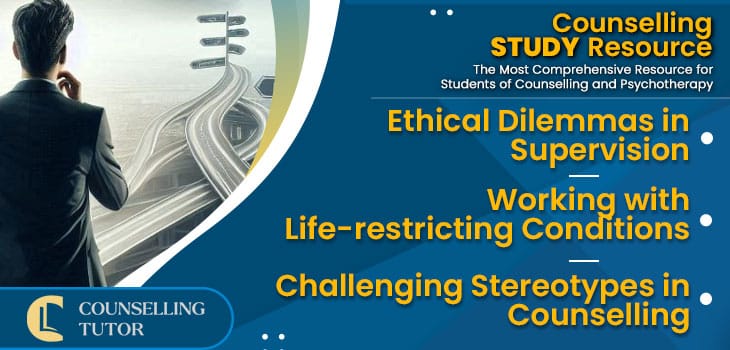See Counselling Skills Used in Real Sessions by Qualified Therapist
Real Sessions – Real Presentations – Real Skills
Gain the competence and confidence to use counselling techniques effectively!

In Episode 331 of the Counselling Tutor Podcast, your hosts Rory Lees-Oakes and Ken Kelly take us through this week’s three topics:
Ethical Problem Solving
In this section, Rory and Ken dive into ethical dilemmas in supervision, an important topic for all counsellors and psychotherapists.
Key points for this section include:
Key Practice Tip: When faced with an ethical dilemma, always write down the dilemma clearly and consider whose dilemma it is-whether it belongs to the client, the counsellor, or both. By doing so, you can more effectively determine the best course of action using the ethical problem-solving matrix.

Real Sessions – Real Presentations – Real Skills
Gain the competence and confidence to use counselling techniques effectively!
In ‘Practice Matters’, Rory interviews Dorothy Hodgkinson about working with clients who have life-restricting conditions. This topic focuses on the therapeutic relationship and the impact of physical and mental health conditions that limit a client’s life.
The main points of this conversation include:
Key Practice Tip: In sessions, practitioners should be willing to adjust the session structure-whether that means allowing breaks, reducing session time, or allowing alternative communication methods like writing or drawing. These adjustments ensure that clients with life-restricting conditions still receive the therapy they need.

On-demand access to a rich lecture library covering theory, skills, and professional development for counselling students—Mapped to the UK awarding body criteria
“The Student Library has been BRILLIANT, I can’t recommend it enough!
It has been a lifeline in helping me prepare for practice and my first clients. If you’re considering it, go-for-it, it’s absolutely worth it!”
Kelly – Graduated and now in practice.
In ‘Student Services’, Rory and Ken discuss challenging stereotypes in counselling training. They explore how stereotypes can form and limit both the therapist’s understanding of their clients and their therapeutic practice.
The key points include:
Key Practice Tip: Therapists should recognise and challenge their own biases and stereotypes. A useful practice is to engage with clients with curiosity and openness, acknowledging that they are not defined by a single characteristic.
Ethical Problem Solving

Get on-demand Certified CPD that is implementable in your practice
